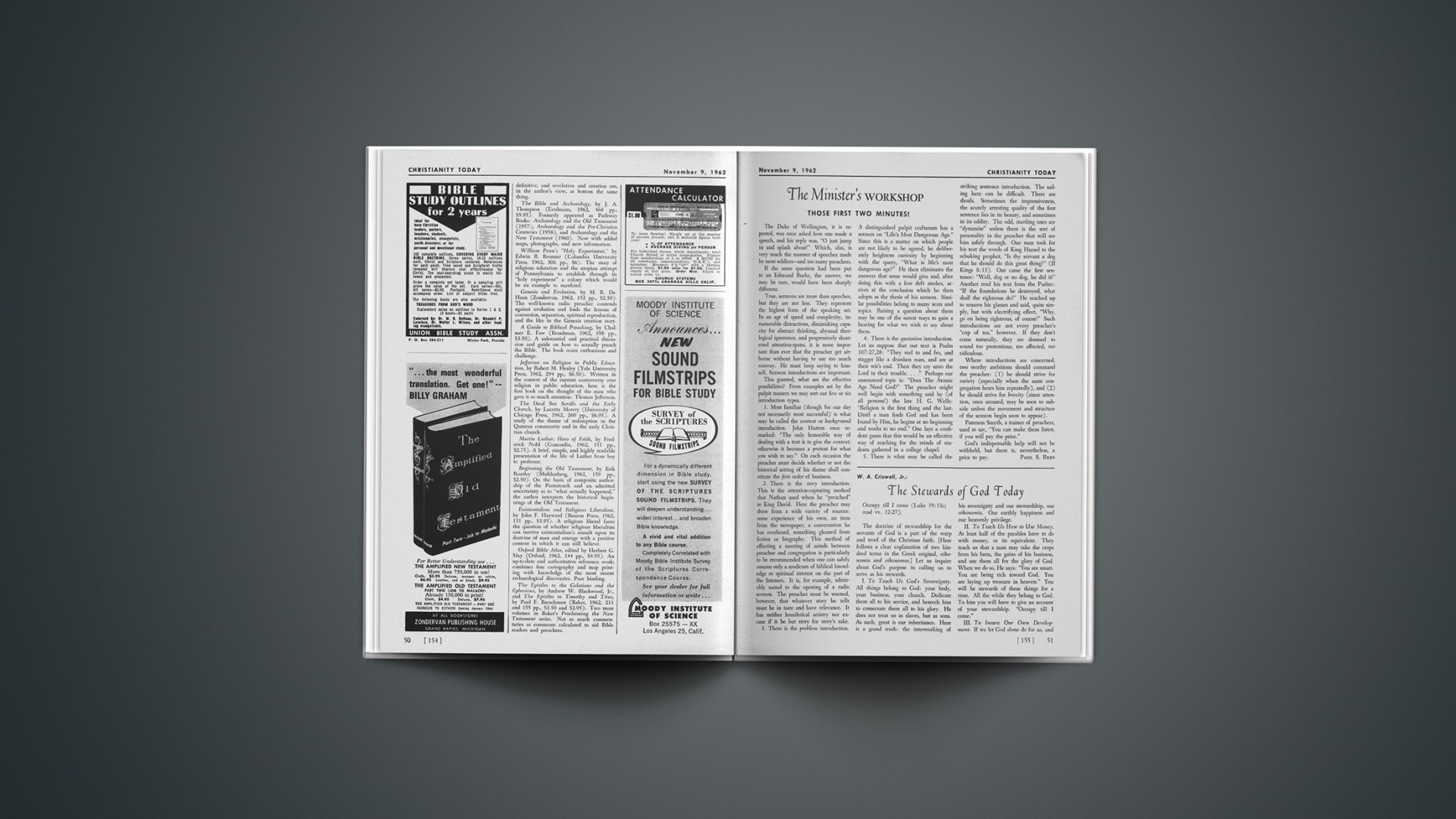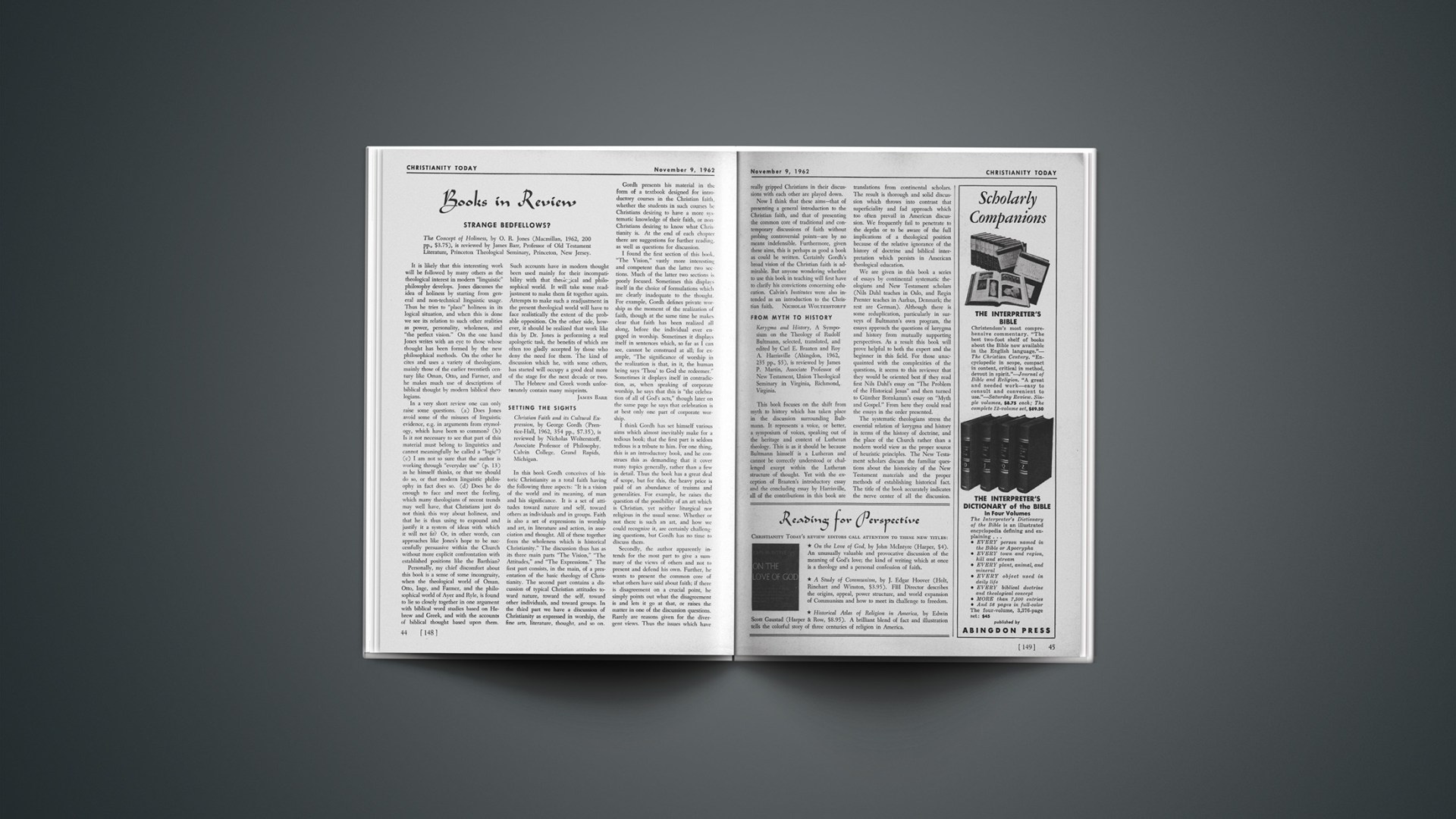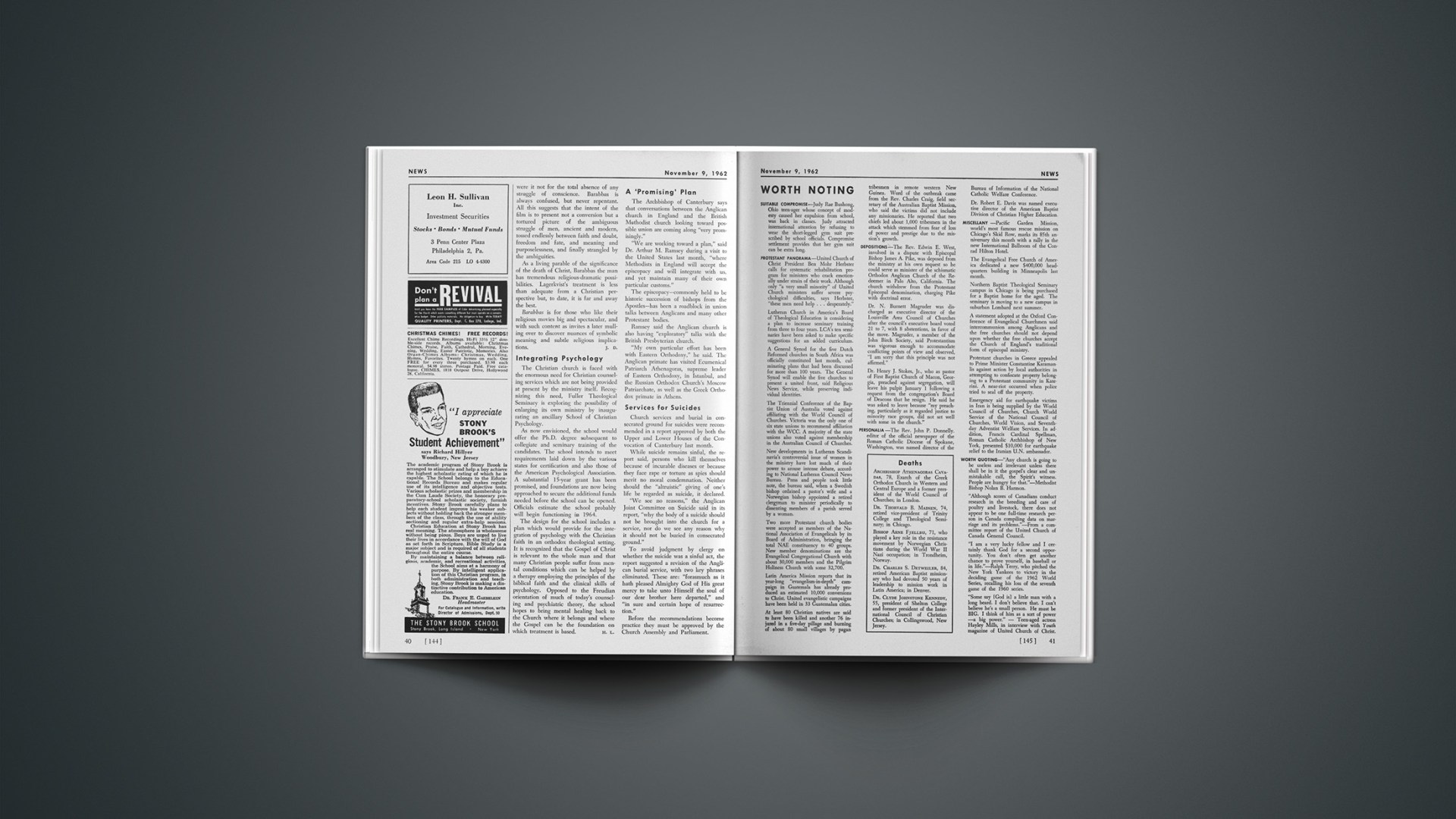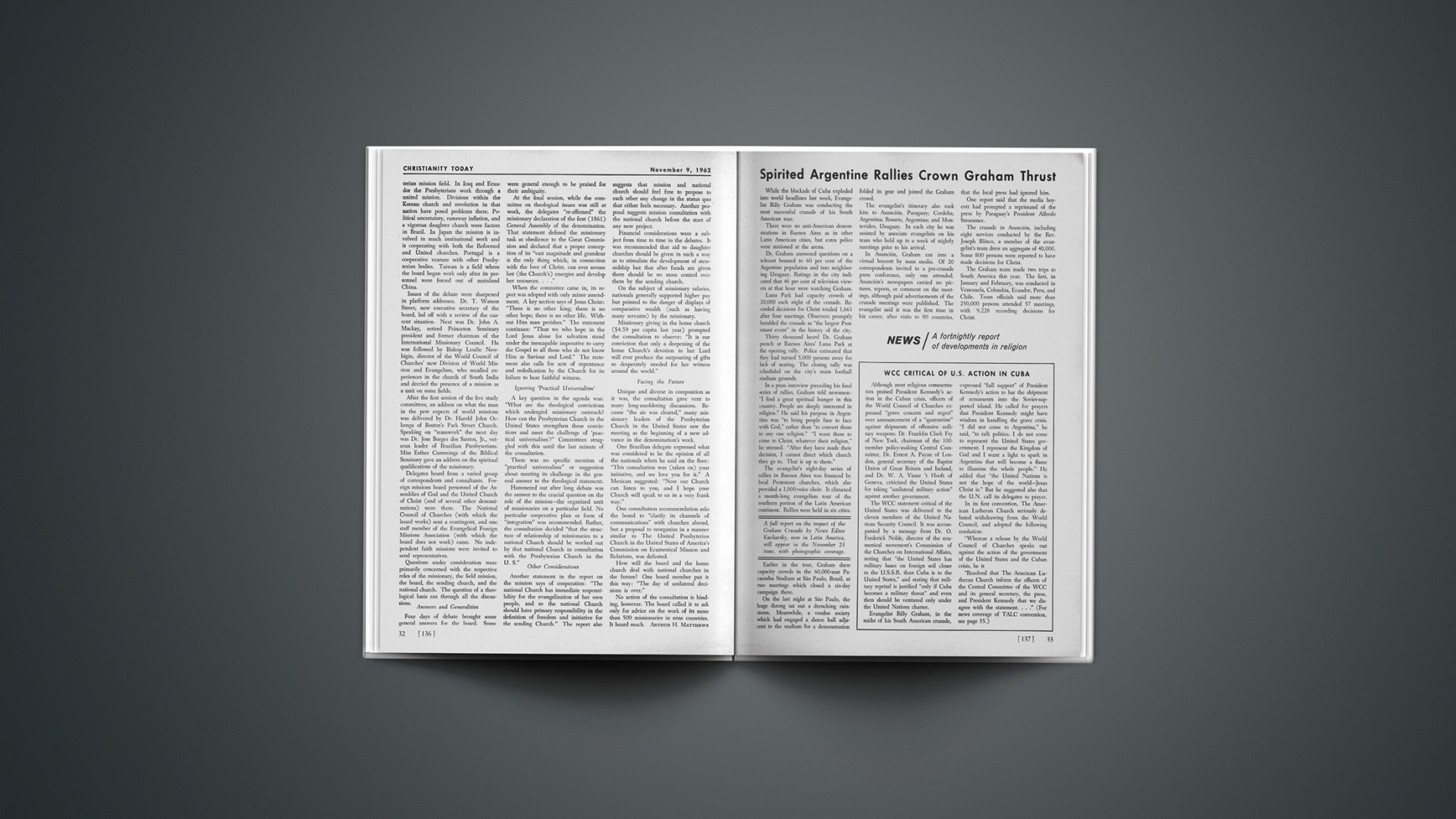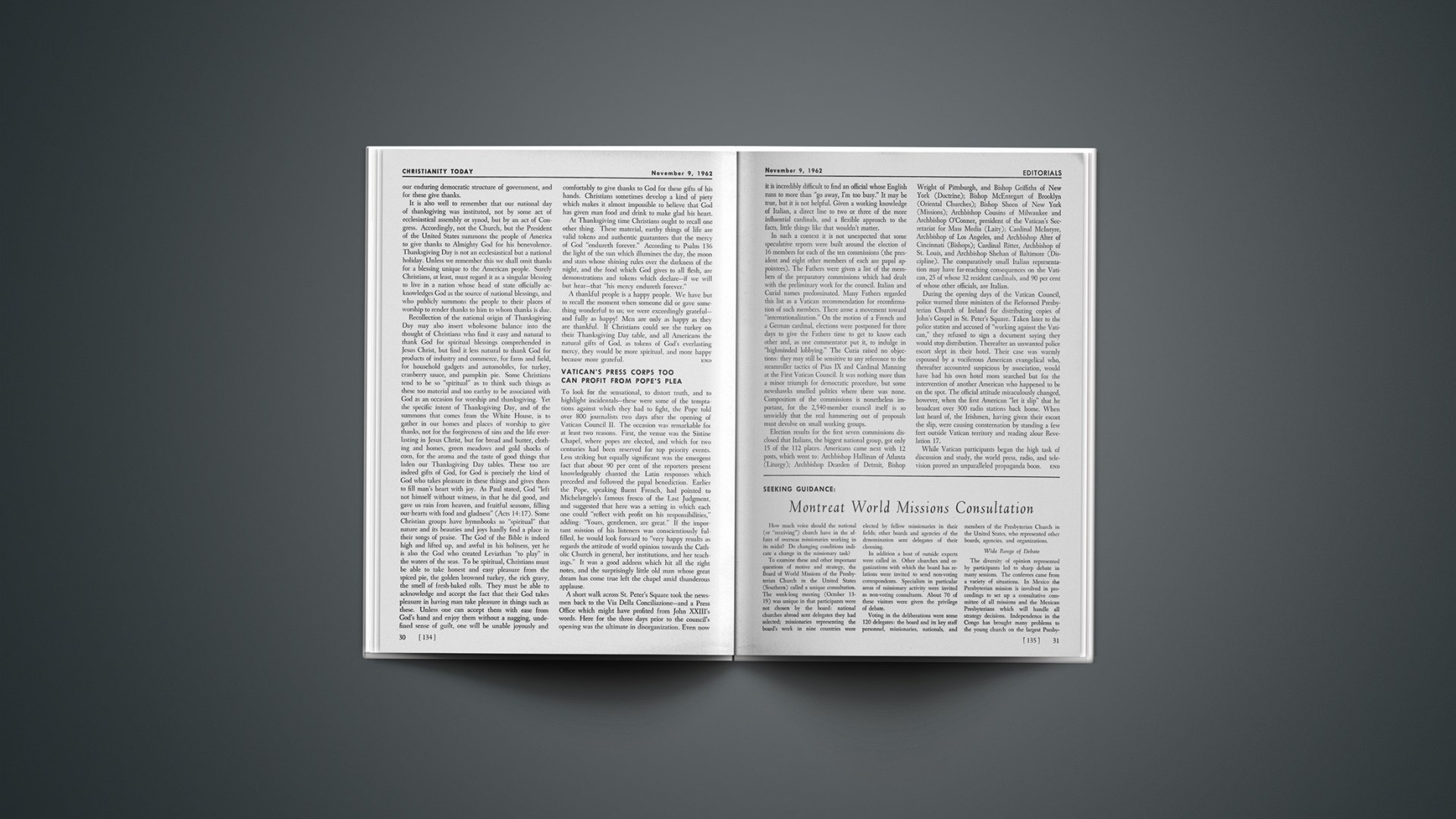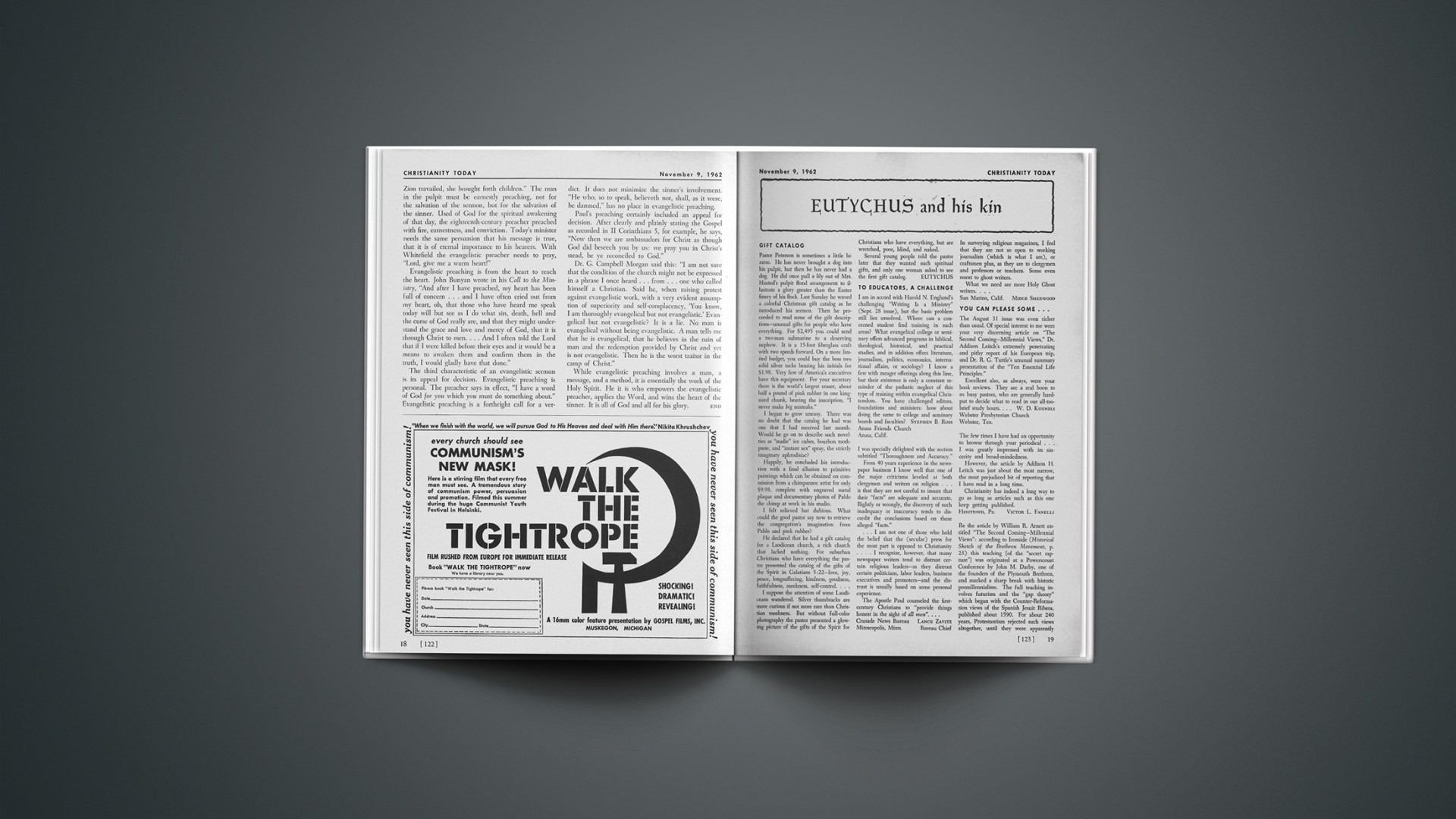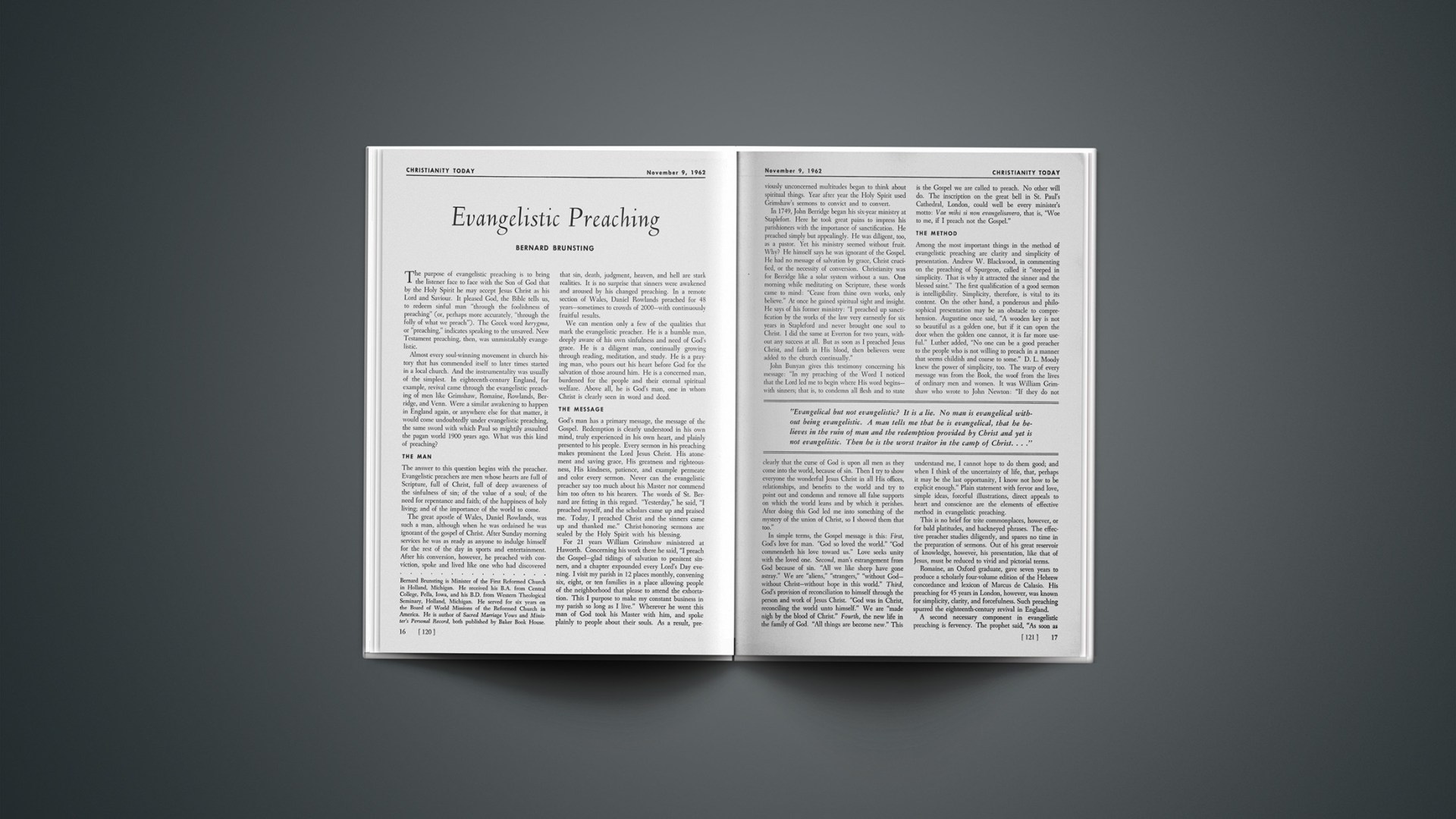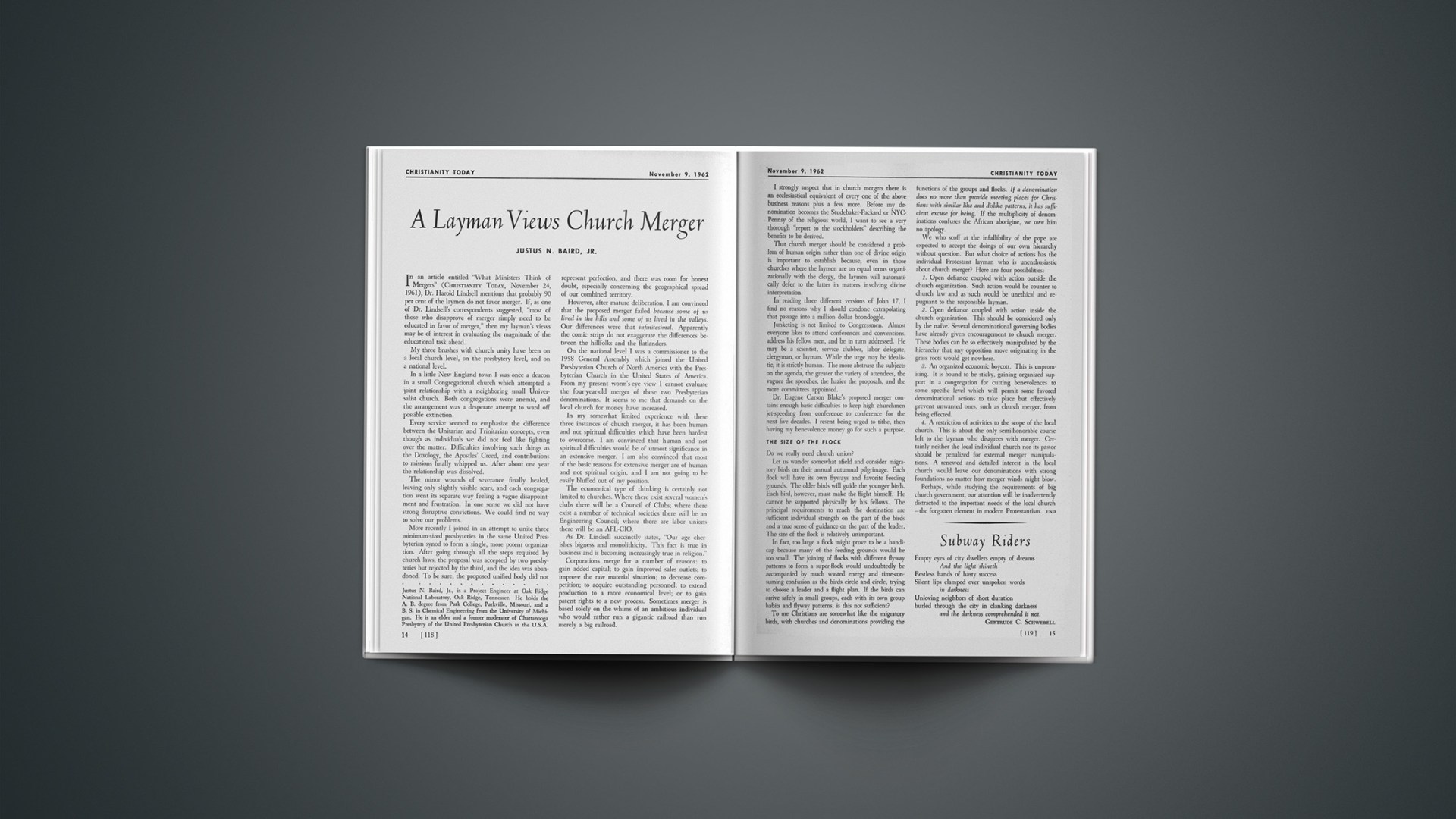Those First Two Minutes!
The Duke of Wellington, it is reported, was once asked how one made a speech, and his reply was, “O just jump in and splash about!” Which, alas, is very much the manner of speeches made by most soldiers—and too many preachers.
If the same question had been put to an Edmund Burke, the answer, we may be sure, would have been sharply different.
True, sermons are more than speeches, but they are not less. They represent the highest form of the speaking art. In an age of speed and complexity, innumerable distractions, diminishing capacity for abstract thinking, abysmal theological ignorance, and progressively shortened attention-spans, it is more important than ever that the preacher get airborne without having to use too much runway. He must keep saying to himself, Sermon introductions are important.
This granted, what are the effective possibilities? From examples set by the pulpit masters we may sort out five or six introduction types.
1. Most familiar (though for our day not necessarily most successful) is what may be called the context or background introduction. John Hutton once remarked: “The only honorable way of dealing with a text is to give the context; otherwise it becomes a pretext for what you wish to say.” On each occasion the preacher must decide whether or not the historical setting of his theme shall constitute the first order of business.
2. There is the story introduction. This is the attention-capturing method that Nathan used when he “preached” to King David. Here the preacher may draw from a wide variety of sources: some experience of his own, an item from the newspaper, a conversation he has overheard, something gleaned from fiction or biography. This method of effecting a meeting of minds between preacher and congregation is particularly to be recommended when one can safely assume only a modicum of biblical knowledge or spiritual interest on the part of the listeners. It is, for example, admirably suited to the opening of a radio sermon. The preacher must be warned, however, that whatever story he tells must be in taste and have relevance. It has neither homiletical artistry nor excuse if it be but story for story’s sake.
3. There is the problem introduction. A distinguished pulpit craftsman has a sermon on “Life’s Most Dangerous Age.” Since this is a matter on which people are not likely to be agreed, he deliberately heightens curiosity by beginning with the query, “What is life’s most dangerous age?” He then eliminates the answers that some would give and, after doing this with a few deft strokes, arrives at the conclusion which he then adopts as the thesis of his sermon. Similar possibilities belong to many texts and topics. Raising a question about them may be one of the surest ways to gain a hearing for what we wish to say about them.
4. There is the quotation introduction. Let us suppose that out text is Psalm 107:27, 28: “They reel to and fro, and stagger like a drunken man, and are at their wit’s end. Then they cry unto the Lord in their trouble.…” Perhaps our announced topic is: “Does The Atomic Age Need God?” The preacher might well begin with something said by (of all persons!) the late H. G. Wells: “Religion is the first thing and the last. Until a man finds God and has been found by Him, he begins at no beginning and works to no end.” One lays a confident guess that this would be an effective way of reaching for the minds of students gathered in a college chapel.
5. There is what may be called the striking sentence introduction. The sailing here can be difficult. There are shoals. Sometimes the impressiveness, the acutely arresting quality of the first sentence lies in its beauty, and sometimes in its oddity. The odd, startling ones are “dynamite” unless there is the sort of personality in the preacher that will see him safely through. One man took for his text the words of King Hazael to the rebuking prophet, “Is thy servant a dog that he should do this great thing?” (2 Kings 8:13). Out came the first sentence: “Well, dog or no dog, he did it!” Another read his text from the Psalter: “If the foundations be destroyed, what shall the righteous do?” He reached up to remove his glasses and said, quite simply, but with electrifying effect, “Why, go on being righteous, of course!” Such introductions are not every preacher’s “cup of tea,” however. If they don’t come naturally, they are doomed to sound too pretentious, too affected, too ridiculous.
Where introductions are concerned, two worthy ambitions should command the preacher: (1) he should strive for variety (especially when the same congregation hears him repeatedly), and (2) he should strive for brevity (since attention, once aroused, may be seen to subside unless the movement and structure of the sermon begin soon to appear).
Paterson Smyth, a trainer of preachers, used to say, “You can make them listen, if you will pay the price.”
God’s indispensable help will not be withheld, but there is, nevertheless, a price to pay.
PAUL S. REES
Occupy till I come (Luke 19:13c; read vv. 12–27).
The doctrine of stewardship for the servants of God is a part of the warp and woof of the Christian faith. [Here follows a clear explanation of two kindred terms in the Greek original, oikonomia and oikonomos.] Let us inquire about God’s purpose in calling us to serve as his stewards.
I. To Teach Us God’s Sovereignty. All things belong to God: your body, your business, your church. Dedicate them all to his service, and beseech him to consecrate them all to his glory. He does not treat us as slaves, but as sons. As such, great is our inheritance. Here is a grand truth: the interworking of his sovereignty and our stewardship, our oikonomia. Our earthly happiness and our heavenly privilege.
II. To Teach Us How to Use Money. At least half of the parables have to do with money, or its equivalent. They teach us that a man may take the crops from his farm, the gains of his business, and use them all for the glory of God. When we do so, He says: “You are smart. You are being rich toward God. You are laying up treasure in heaven.” You will be stewards of these things for a time. All the while they belong to God. To him you will have to give an account of your stewardship. “Occupy till I come.”
III. To Insure Our Own Development. If we let God alone do for us, and keep on doing so, we may become like lazy sea gulls, which depend on fishermen to feed them, and lose their God-given ability to forage for themselves. In Europe a large segment of the Church is supported by the government. While visiting in America one of the leading Continental theologians said to me:
“The most amazing thing I have noticed among the Churches of America is the great movement of Stewardship.… The Churches stand on their own feet.… Stewardship has done for the Churches of America what the Reformation did for the Churches of Europe in the sixteenth century, and what the great missionary movement did in the nineteenth century.”
The Christian reason for giving is gratitude to God for his “unspeakable Gift.” Oh, as you devote to him all that you have, bless his holy name! Your talents, great or small, belong to him. They have come from him, and are to be used for his glory. In his Kingdom, both here and in the world to come, every day is payday. So may every one of you become a good steward of God’s manifold grace.—From Special Day Sermons for Evangelicals, ed. by Andrew W. Blackwood, Channel Press, Manhasset, New York, c. 1961.
SERMONS ABRIDGED BY DR. ANDREW W. BLACKWOOD
W. A. CRISWELL, JR., The Stewards of God Today;MARIANO DI GANGI, The Gospel According to Jonah;PAUL S. REES, The Glory of Christlike Giving; and DR. BLACKWOOD’SThe Gospel in Favorite Christmas Hymns.
I will sacrifice unto thee with the voice of thanksgiving; I will pay that which I have vowed. Salvation is of theLORD (Jonah 2:9; read verses 1–10).
According to Spurgeon, prince of preachers, Jonah learned this theology in a strange college. When he uttered these words he was in the belly of a great fish. Here is the truth of God’s sovereign grace. Let us together consider this saving truth, and the personal consequences.
I. The Grand Truth. Simply stated it is this: though man is lost on account of his revolt and his fleeing from God, yet he can be saved. God has mercifully planned and provided salvation. Only when like Jonah a sinner becomes aware of his state and turns to God for pardon can he begin to worship aright. When once he is redeemed, worship consists largely of thanksgiving for salvation. Worship likewise calls for the making of vows, not least about the giving of money gladly as a token of gratitude for redemption. Such joyous worship with generous giving rests on sound Bible theology. Thanksgiving for redemption accords with the character of God. Let us therefore think of the response we should make to this revelation of God’s grace.
II. The Personal Consequences. A. Since salvation is of the Lord, we should be humble. We cannot save ourselves. In themselves all our noble intentions, all our high endeavors to do good works and to merit heaven, all our religious observances will not save us. First we must humbly surrender to God and let him save us. “By grace are ye saved through faith; and that not of yourselves: it is the gift of God; Not of works, lest any man should boast” (Eph. 2:8, 9).
B. We must be prayerful. No matter how learned and eloquent, how forceful and sincere, the preacher cannot save anyone. The Lord Jesus has asked us to preach and be his witnesses. But even Billy Graham must be prayerful that God will accompany his preaching with the convicting, converting, confirming power of the Spirit. Without him we can do nothing. Pray!
C. We should be confident. Were our salvation to depend on our own strength and wisdom, which of us could face the trials and temptations of the future with confidence? Alone we are bound to fail. But we need not depend on our feelings, which are bound to rise and fall like the graphs of the stock market, up one day and down the next. But we rest on God’s unchanging purpose, and that cannot fail. “My hope is built on nothing less than Jesus’ blood and righteousness.”
D. We should be grateful. If we are lost, we have only ourselves to blame, because God has freely provided salvation If we are saved, we have only God to thank, for he has done all this of his own grace. With our eyes open to the mercies of God, beholding his sovereign grace in redemption, let us give thanks to our Saviour, and show our gratitude by bringing others, one by one, to believe in Christ as Redeemer and King. “Salvation is of the Lord.”—Pastor, Tenth Presbyterian Church, Philadelphia.
Seven Facts About Tithing
The following statements on tithing were used by Dr. Rees in the adjacent sermon on stewardship.
The late Robert E. Speer was a strong advocate of tithing. The substance of what he wrote appears in seven points:
1. Before the Law Abraham tithed. Under the Law the Jews tithed. For Christians to do less would be a disgrace.
2. Men need a practical principle like the tithe to make sure that stewardship is a reality in their lives.
3. God does not need the tithe, but he needs the tither, and man needs to practice tithing for his own sake.
4. Tithing helps to protect us from the perils of money worship.
5. Our Lord approved tithing in his commendation of the Jews for their diligence in this regard.
6. The tithe proves to be a good way of securing regularly for God’s use the money needed for the extension of his Kingdom.
7. In addition to its good results, the tithe is fundamentally right.
Up to their ability, yes, and I bear them witness, beyond their ability, they have given (2 Cor. 8:3, Berkeley; read vv. 1–15).
Neither Jesus nor his greatest interpreter ever had the slightest embarrassment in talking to Christian disciples about money, and the right use of money in support of the Christian cause. Here the Apostle seizes on a case to make the Corinthians more stewardship-conscious, more Christlike in liberality. The glory of giving! Let’s look at it.
I. The Surpassing Measure. [Here a moving example from life.] Stewardship beyond the range of ability and beyond the call of duty! The glory of giving!
II. The Searching Meaning. In the Christian order the giving of money never comes first. It is the giving of oneself that is the first consideration. Here, then, is the central meaning of dedication: the giving of oneself to God.
Were the whole realm of nature mine,
That were a present far too small;
Love so amazing, so divine,
Demands my soul, my life, my all.
III. The Sensible Method. Christlike giving is faithful: not starting and stopping, pledging and defaulting; systematic, not left to impulse and whim; proportionate: those having more giving more, those having less giving less. What is most important of all is the dedicated will to tithe. “God loves a hilarious giver” (2 Cor. 9:7, Berkeley).
IV. A Supreme Model. “Ye know the grace of our Lord Jesus Christ, that, though he was rich, yet for your sakes he became poor, that ye through his poverty might be rich” (2 Cor. 8:9). In the light of his Cross, where all the glory of giving becomes dazzlingly luminous, can you quibble or complain for one split minute over the giving of tithes and offerings to the Church, which is his body?—From Christian: Commit Yourself, Revell, Westwood, New Jersey, 115–29, c. 1957.
A beloved evangelist and pastor, J. Wilbur Chapman, used to say that where one person comes to Christ because of the Christmas star, at least ten come because of Christmas song. So why not in December have an evening series of four or five sermons from that many hymns? According to the number of Sundays, have the people select four or five Christmas songs that appear in the church hymnal. Early in November the hymn titles should appear in the bulletin.
The four may be: “O Come, All Ye Faithful”; “O Little Town of Bethlehem”; “Hark, the Herald Angels Sing”; “Joy to the World.” This last has not a word about Christmas, and may come the Sunday before New Year’s. In any printed list these titles need not appear. In the sermons the stress should fall, not on the author and the composer, but on the Gospel message. Each hymn sings about Christ. Note four sermon topics:
The Call to Christmas Worship
The Quietness of Christmas Day
The Noblest of Christmas Hymns
The Afterglow of Christmas Joy
After the bloodiest of our wars, on Christmas Day, 1865, Phillips Brooks rode from Jerusalem to Bethlehem. Four years later—at the request of the organist, Louis H. Redner, who composed the music—Brooks wrote the simplest of our Christmas hymns, “O Little Town of Bethlehem.” He did it for boys and girls, but his song appeals to older children of God, too. It sings about the Incarnation, ever dear to the heart of Brooks.
Let us look at the four stanzas, and the Good News that they sing, about the quietness of the Christmas Gospel:
I. The Place Where Christ Was Born
II. The Way that Christ Was Born
III. The Prayer for Him to Be Born
IV. The Hearts Where Christ Is Born “O come to my heart, Lord Jesus, there is room in my heart for Thee!”
One year we had such a brief series in a church where the evening attendance was disappointing. The first evening more persons came than the officers had ever seen in church at night. Each evening the numbers grew. Afterwards the evening attendance never dropped to what it had been before. Also, the people began to think of a real hymn as Bible truth set to music. Later we followed the same plan before Easter, with an evening series, not long, “The Gospel in Beloved Hymns about the Cross.” Thank God for the Gospel that sings and for laymen who love to hear a sermon about a hymn!

